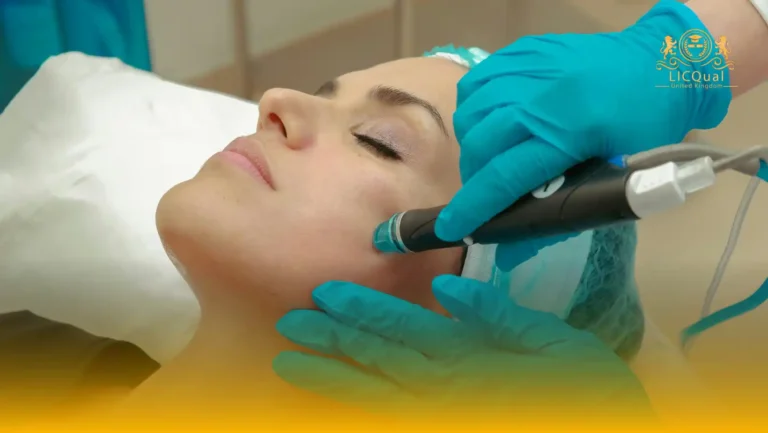The LICQual Level 3 Certificate in Clinical Nutrition (Cert Clinical Nutrition) is a professionally developed qualification designed to equip learners with essential knowledge and skills in the science of nutrition and its practical application in clinical settings. This course focuses on the principles of nutrition, dietary planning, and the role of nutritional interventions in promoting health and managing specific conditions.
Ideal for professionals seeking to strengthen their expertise, this qualification supports career progression, enhances practical knowledge, and contributes significantly to Continuing Professional Development (CPD). Learners will gain a deeper understanding of the relationship between diet, lifestyle, and overall wellbeing, enabling them to provide evidence-based nutritional guidance and support within healthcare, wellness, or related professional environments.
The programme is structured to provide both theoretical knowledge and practical application, ensuring learners can confidently apply their learning in real-world contexts. By completing this qualification, individuals not only expand their career opportunities but also contribute positively to improving health outcomes through effective nutritional practices.
Centres delivering this qualification must ensure that competent and qualified staff are available, supported by appropriate learning materials, facilities, and resources. This commitment guarantees high-quality training, effective learner engagement, and successful achievement of learning outcomes.
The LICQual Level 3 Certificate in Clinical Nutrition is therefore an excellent pathway for those aspiring to advance their knowledge in clinical nutrition while building a solid foundation for future career development and specialised study.
Course Overview
Qualification Title
LICQual Level 3 Certificate in Clinical Nutrition (Cert Clinical Nutrition)
Total Units
6
Total Credits
24
GLH
120
Qualification #
LICQ2200998
Qualification Specification
To enroll in the LICQual Level 3 Certificate in Clinical Nutrition (Cert Clinical Nutrition), applicants must meet the following criteria:
|
Qualification# |
Unit Title |
Credits |
GLH |
|---|---|---|---|
|
LICQ2200998-1 |
Fundamentals of Human Anatomy and Physiology for Nutrition |
4 |
20 |
|
LICQ2200998-2 |
Principles of Nutrition Science and Macronutrients |
4 |
20 |
|
LICQ2200998-3 |
Micronutrients and Their Role in Health and Disease |
4 |
20 |
|
LICQ2200998-4 |
Dietary Planning and Nutritional Assessment |
4 |
20 |
|
LICQ2200998-5 |
Clinical Nutrition in Health and Disease Management |
4 |
20 |
|
LICQ2200998-6 |
Professional Practice, Ethics, and CPD in Nutrition |
4 |
20 |
By the end of this course, learners will be able to:
Unit 1: Fundamentals of Human Anatomy and Physiology for Nutrition
Learners will be able to:
- Explain the structure and function of major body systems relevant to nutrition, including digestive, circulatory, and endocrine systems.
- Describe how body systems interact to maintain homeostasis and overall health.
- Analyse the physiological processes affecting nutrient absorption, metabolism, and utilisation.
- Apply anatomical and physiological knowledge to assess nutritional needs in different populations.
Unit 2: Principles of Nutrition Science and Macronutrients
Learners will be able to:
- Demonstrate knowledge of macronutrients (carbohydrates, proteins, fats) and their roles in energy production and body function.
- Evaluate dietary intake in relation to recommended nutrient guidelines.
- Explain energy balance and factors affecting caloric requirements.
- Apply macronutrient principles to develop appropriate dietary plans.
Unit 3: Micronutrients and Their Role in Health and Disease
Learners will be able to:
- Identify essential vitamins and minerals and describe their physiological functions.
- Recognise signs and symptoms of micronutrient deficiencies and excesses.
- Analyse the impact of micronutrients on disease prevention and health maintenance.
- Apply knowledge of micronutrients to support evidence-based dietary recommendations.
Unit 4: Dietary Planning and Nutritional Assessment
Learners will be able to:
- Conduct comprehensive nutritional assessments using appropriate tools and techniques.
- Develop personalised dietary plans for individuals with varying health needs.
- Evaluate the effectiveness of dietary interventions using scientific evidence.
- Apply critical thinking to modify diets based on lifestyle, health status, and clinical requirements.
Unit 5: Clinical Nutrition in Health and Disease Management
Learners will be able to:
- Explain the role of nutrition in the prevention and management of common medical conditions.
- Interpret clinical data to inform nutritional interventions.
- Design dietary strategies to support health outcomes in clinical populations.
- Critically evaluate current research and guidelines in clinical nutrition practice.
Unit 6: Professional Practice, Ethics, and CPD in Nutrition
Learners will be able to:
- Demonstrate professional conduct, ethical decision-making, and confidentiality in nutritional practice.
- Reflect on personal development and engage in Continuing Professional Development (CPD).
- Communicate nutritional information clearly and effectively to clients and colleagues.
- Apply legal, regulatory, and professional standards to ensure safe and effective practice.
The LICQual Level 3 Certificate in Clinical Nutrition (Cert Clinical Nutrition) is designed for healthcare professionals, students, and individuals who want to build a career in nutrition and patient care. This internationally recognized qualification is perfect for anyone seeking accredited training, career advancement, or specialized knowledge in clinical nutrition. Whether you’re starting your journey or enhancing existing skills, this Level 3 Clinical Nutrition training program provides the right pathway.
Healthcare Professionals
- Doctors and physicians aiming to integrate nutrition into patient treatment plans
- Nurses seeking advanced knowledge in dietary care and recovery support
- Pharmacists interested in understanding nutrition’s role in medication outcomes
- Allied health workers looking to expand their clinical expertise
- Hospital staff who want accredited Clinical Nutrition certification
Aspiring Nutritionists
- Students preparing for careers in nutrition and dietetics
- Individuals seeking a recognized Clinical Nutrition Level 3 qualification
- Learners who want to become certified Clinical Nutritionists
- Those searching for the best Clinical Nutrition certificate for healthcare careers
- People interested in online Clinical Nutrition courses with international accreditation
Public Health and Community Workers
- Professionals working in NGOs or community health programs
- Public health educators promoting nutrition awareness
- Social workers supporting nutrition and wellness initiatives
- Policy makers interested in evidence‑based nutrition strategies
- Trainers delivering nutrition workshops in schools or communities
Fitness and Wellness Coaches
- Personal trainers who want to add nutrition expertise to their services
- Wellness consultants seeking accredited nutrition qualifications
- Diet coaches aiming to provide clinical‑level nutrition advice
- Fitness instructors expanding into holistic health and nutrition
- Lifestyle coaches looking for internationally recognized nutrition certification
Students and Career Changers
- College graduates exploring healthcare and nutrition careers
- Individuals switching from non‑medical fields to clinical nutrition
- Learners seeking flexible online Clinical Nutrition training programs
- Students aiming for higher diplomas or degrees in nutrition and public health
- Career changers looking for globally recognized qualifications
International Learners
- Students in the UK, Middle East, and Asia seeking accredited Clinical Nutrition certificates
- Professionals needing globally recognized qualifications for career mobility
- Learners searching for online Clinical Nutrition diplomas with flexible study options
- Healthcare workers abroad aiming to strengthen their professional profile
- International candidates preparing for advanced nutrition studies
Continuing Professional Development (CPD) Seekers
- Professionals needing CPD credits in healthcare and nutrition
- Medical staff updating their knowledge with accredited Clinical Nutrition training
- Nutrition advisors enhancing their qualifications for career growth
- Educators seeking structured CPD in nutrition and health sciences
- Practitioners aiming to stay current with global nutrition standards
To deliver the LICQual Level 3 Certificate in Clinical Nutrition (Cert Clinical Nutrition) effectively, centres must ensure the following requirements are met:
- Qualified and Competent Staff: Centres must have experienced and appropriately qualified trainers with expertise in nutrition, health sciences, or related fields to deliver high-quality learning and support learners effectively.
- Adequate Learning Materials: All necessary teaching resources, including textbooks, digital materials, case studies, and assessment tools, must be available to support learner engagement and understanding.
- Access to Facilities and Equipment: Centres should provide suitable classrooms, practical areas, or online platforms with reliable technology to facilitate both theoretical and practical learning.
- Commitment to International Standards: Centres must ensure teaching, assessment, and learning activities adhere to international best practices and quality assurance standards.
- Assessment and Feedback Systems: Robust assessment procedures and timely feedback mechanisms should be in place to monitor learner progress and support achievement of learning outcomes.
- Support for CPD: Centres should encourage and facilitate Continuing Professional Development (CPD) for learners and staff, promoting ongoing skills enhancement and professional growth.
- Health and Safety Compliance: Centres must ensure safe learning environments in line with relevant health and safety regulations, particularly for practical nutrition activities.
Meeting these requirements ensures learners receive high-quality training, are supported throughout their studies, and achieve the full benefits of the LICQual Level 3 Certificate in Clinical Nutrition.
Assessment and Verification
All units within this qualification are subject to internal assessment by the approved centre and external verification by LICQual. The qualification follows a criterion-referenced assessment approach, ensuring that learners meet all specified learning outcomes.
To achieve a ‘Pass’ in any unit, learners must provide valid, sufficient, and authentic evidence demonstrating their attainment of all learning outcomes and compliance with the prescribed assessment criteria. The Assessor is responsible for evaluating the evidence and determining whether the learner has successfully met the required standards.
Assessors must maintain a clear and comprehensive audit trail, documenting the basis for their assessment decisions to ensure transparency, consistency, and compliance with quality assurance requirements.







